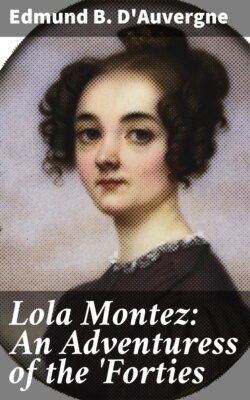Читать книгу Lola Montez: An Adventuress of the 'Forties - Edmund B. D'Auvergne - Страница 7
III
ОглавлениеFIRST STEPS IN MATRIMONY
Thus Lola found herself in Ireland, the wife of a penniless subaltern—exactly the position of her mother twenty years before. “All for love and the world well lost,” she might have exclaimed. There is no reason to suppose that disillusionment came to her any sooner than to other hot-headed and romantic young ladies similarly placed. She was accustomed to view her early married life in the bitter light of subsequent experience, and forgot all the sweets and raptures of first love. Women of her temperament always find it hard to believe that they ever really loved men whom they have since learned to hate. Even by her own account, those months in Ireland were not altogether unrelieved by the glitter for which her soul craved. Her husband took her to Dublin, she informs us, and presented her to the Lord-Lieutenant. His Excellency Lord Normanby was one of the few good rulers England has placed over Ireland, and like most clever men, he was an admirer of pretty women. Lola seems to have been made much of by him. He paid her many compliments, among others this, “Women of your age are the queens of society”—a remark which may be addressed with equally good effect to ladies anywhere between seventeen and seventy. Mr. James began to grow restive under the fire of admiration directed by great personages upon his young wife. It is not impossible to believe that she flirted. Her husband decided to withdraw her from the seductions of the viceregal court, and retired with her to some spot in the interior, the name of which has not been transmitted to us. Lola, in memoirs she contributed years after to a Parisian newspaper, describes her life in this retreat as unutterably tedious. The day was passed in hunting and eating, these exercises succeeding each other with the utmost regularity. Meanwhile, the system was sustained by innumerable cups of tea, taken at stated intervals, and with much deliberateness.
Ireland had changed since the emancipation of the Catholics. It was not with tea that the heroes of Charles Lever’s time beguiled the tedium of existence.
“This dismal life,” continues our heroine, “weighed on me to such an extent that I should assuredly have done something desperate if my husband had not just then been ordered to return to India.” Lola, it will have been seen, entertained little affection for her native land. She had no recollection of her childhood there, and she never afterwards thought of the country except in connection with the detested husband of her youth.
In the second year of the Queen’s reign she left Ireland, to return years after in very different circumstances. Her fondest memories were of the East, towards which she now gladly turned her face for the second time. “On the old trail, on the out trail,” she sailed aboard the East Indiaman, Blunt, her husband at her side. There is a curious parallelism between her mother’s life and her own up till now, which she could not have failed to notice. Her memories of the voyage strike me rather as having been specially spiced for the consumption of Parisian readers, than as an authentic relation. James, we are told, neglected his young wife, and exhibited an amazing capacity for absorbing porter. Finding the time heavy on her hands, Lola resorted to the commonest of all distractions on passenger ships—flirting. While her consort lay sleeping “like a boa-constrictor” in his bunk, his wife’s admirers used to slip notes under the door, these serving her as spills for Mr. James’s pipe. The gentlemen who fell under the spell of Lola’s fascinations at this stage of her career were three in number—a Spaniard called Enriquez, an Englishman, simply described as John, and the skipper himself. This “colossal sailor” seems to have been somewhat of a philosopher. One of his profound reflections has been handed down to us, and is worth recording: “Love is a pipe we fill at eighteen, and smoke till forty; and we rake the ashes till our exit.”
Lola thus pictures as a man-enslaving Circe the girl who was described by a contemporary as a good little thing, merry and unaffected. I doubt if the flirtations here magnified into intrigues were very serious affairs, after all. It is rather pathetic, the woman’s shame for the simplicity of the girl, and her evident desire to paint her redder than she was. It is probable that the girl would have been quite as much ashamed if she could have seen herself at thirty.
